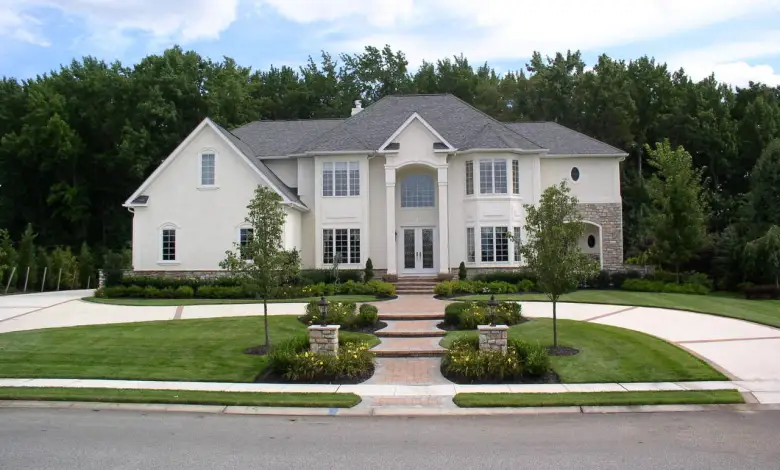How To
Home insurance in the United States

Whether you own or rent your home in the United States, taking out home insurance is the first thing to do to protect your property against loss and damage, but also against legal proceedings. Home insurance is intended to cover unforeseen damage… But how does this insurance actually work in the United States?

What exactly is home insurance?
As its name suggests, home insurance is insurance for private homes and their annexes. Its main role is to cover damage to your property, but also liability for injuries and material damage that you or members of your family may cause to other people. This also includes damage caused by pets!
Unlike car insurance, the law does not require you to have home insurance, but as with any insurance, it is all about protecting your property against the unknown…
Why do you need home insurance?
As a landlord, it’s about protecting you financially if an accident happens to your house, apartment or property. Buying your home is probably one of the biggest investments of your life! If your property has been destroyed by fire or damaged by a natural disaster, you will need money to repair or replace it. If you are the victim of theft or vandalism, insurance can reimburse you for losses or pay for repairs. If a friend of yours is injured in your home, liability insurance can help pay for medical expenses.
Unlike France, for example, if you rent your apartment: the tenant is not obliged to take out insurance and when he does, he insures his property, not yours. If your tenant is injured for example because of your garage door, you can be responsible.
As a tenant, it is in your best interest to also take out insurance because the landlord provides you with accommodation, but you are not insured for the belongings inside. Also, if someone gets hurt in your apartment, you may have to foot the bill for their care. And in the USA it can be very salty!
Whether you own or rent your home in the United States, it is strongly advised to take out home insurance, because it must be remembered that in the land of Uncle Sam the notion of responsibility is extremely strong , legal proceedings in the event of accidents are commonplace and very high legal costs!

Hurricane insurance in the United States (Photo credit: John Carkeet – Flickr CC BY 2.0)
Home insurance in the United States: how does it work?
As in France, the risks covered vary according to the type of contract chosen. As a general rule, damage caused by most disasters is covered: theft, burglary, vandalism, glass breakage, fire or explosion, water damage, lightning, freezing or snow, flooding, etc.
However, it is important to know that in the United States all-natural disasters are not covered by home insurance, that the risks differ according to the states and that the insurers can exclude some of them. In Florida, for example, most contracts exclude hurricanes or floods, even though these are major risks. In California, earthquakes and fires can be excluded even though these are also the first two risks for homes. Apart from these “special” cases, insurance policies also include more traditional exclusions such as normal wear and tear, gradual deterioration or mechanical breakdown.
In case of exclusion of certain risks, it is obviously possible to add guarantees within the framework of an additional contract, which is of course paying.
In the event of a claim, an expert is appointed to determine the number of damages. It is therefore important to keep invoices for renovations, purchases of furniture or equipment outside your home so that you can access them even if your house or condo has been destroyed.
The indemnity then depends on the type of indemnity subscribed to in the contract. The expert can then either:
– Take into account the purchase value of the property (ACV – Actual Cash Value) minus the depreciation, because after a few years the furniture or electronic equipment is no longer worth the same.
– Reimburse on the new value of the goods “Replacement cost”, that is to say at the purchase price on the day of the complaint.
Note: home insurance does not respond to the negligence factor. If the expert sent by the insurer proves that you have been negligent, then you are not or only partially insured. This may be the case, for example, if you were burglarized because you left a door or a window open.

Traditional house in the United States (Photo credit: Bon Searle – Freeimages.com)
What are the home insurance policies in the USA ?
Home insurance generally consists of two types of coverage.
On the one hand, protection that covers most accidental events that may affect your home and all the material goods it contains damage insurance (for French people) or all-risk insurance (for Quebecers). Non-life insurance (DP) includes 3 levels of benefits (DP-1, DP-2, DP-3) which offer more or less extensive coverage.
On the other hand, the coverage that protects against bodily injury or property damage that you may unintentionally cause to another person: “Homeowners” civil liability.
On your insurance contract, the different guarantees and the amounts for which you are covered must be clearly defined:
– “Dwelling”: insurance of the house or your apartment, in the case of a condo,
– “Other structures on your property”: constructions on the property (garage or shelter),
– “Personal property/contents” : personal property in the property,
– “Loss of Use”: compensation received in the event that you cannot use your home due to of a disaster and this, during the time necessary for its restoration,
– “Liability” : protection if you are declared legally responsible for an accident resulting in bodily injury or damage to the property of others,
– “Medical payments”: covers the medical expenses of people injured on your property, without any notion of civil liability, i.e. that is say that this guarantee can apply even if you are not declared responsible for the accident.
Note: if you own an apartment in a condominium, the common areas are covered by the policy taken out by the association. In a traditional condo home insurance, you are generally covered for your personal property located inside as well as the renovations made.
How much does homeowners insurance cost in the USA?
The price of home insurance depends on the contract and the options chosen.
The criteria that have the greatest impact on prices are generally:
– The level of cover: the amount of insurance (limits) and deductible (deductible),
– The type of compensation: replacement cost (replacement cost) or current value (actual cash value or ACV),
– The risks covered by the contract (theft, fire, water damage, hurricanes, etc.),
– The use of your home (main or seasonal, rental, etc.),
– The type of property insured and the year of construction,
– The protections fitted to the accommodation: fire-fighting system, anti-theft alarm, protection against hurricanes, etc.
To be properly covered by home insurance, you must properly assess the value of the property before signing the contract because the amount of the monthly payments is determined by the risk you represent for the insurer. The higher the value of the assets, the greater the risk and the greater the contributions. Also be careful not to underestimate the value of the goods to pay less expensive monthly payments, because it means taking the risk (in the event of a total loss) of having insufficient compensation for the damaged goods.
Home insurance is an important expense item. There are nevertheless levers which make it possible to reduce the note such as for example:
– Installing an anti-burglary alarm system connected to a remote monitoring centre,
– Installing a water damage prevention system of the automatic closing type of entrances to water,
– Put in place a fire protection system,
– Install hurricane protection,
– Have not affected any claim for a loss in recent years,
– Group several insurance policies with the same insurer (automotive, health, etc.) .).
How to choose home insurance?
The choice of home insurance is made according to the needs and the level of compensation you wish to have in the event of a claim. The best way to identify the amount needed to replace all assets is to do a complete inventory. This inventory can also be useful if you have to make a claim later and need to know exactly what you have lost.
The field of insurance remains a complex subject for most of us. The best is to call on a specialist (broker or insurer), preferably French-speaking for more facilities. He can help you, on the one hand, to identify your needs and, on the other hand, to fully understand the contracts offered and check with you that the level of guarantee you choose is sufficient.
